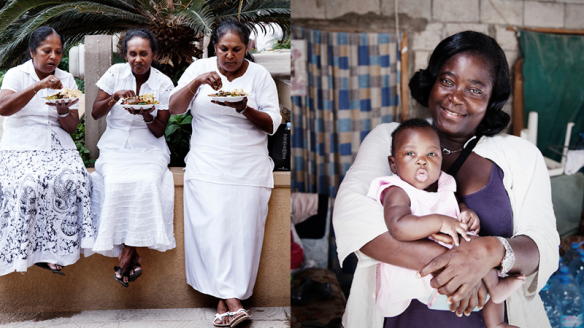
Eliza Marks, Technical Officer, FAIRWAY project
“She came here to work, not to make friends… so why should I give her a day off? I don’t get one!” Mariam* said, to laughter and nods of agreement from the group.
It was a bright and busy morning in central Beirut, and I was sitting in on an information session for people who employ domestic workers.
I had heard Mariam’s view many times before, as it reflects a common perspective in Lebanon and the region more broadly: that domestic work is not ‘real’ work, and that standard working conditions are irrelevant.
What was most shocking to me was not Mariam’s comment, made at the beginning of the session, but the transformation in her attitude and the commitment to change she expressed at the end of it.
Taking part in role play sessions, Mariam and her colleagues were put in the shoes of the domestic workers they employ, encouraging them to understand the workers’ perspective and experience. “I never realized that domestic workers pay high recruitment fees to come here… I know she has a husband and children in Sri Lanka, it must be difficult.”
The sessions were being conducted as part of the ILO-supported My Fair Home campaign which aims to change attitudes and behaviours, to help ensure decent working conditions.

Photo 1 – Sri Lankan migrant domestic workers in Lebanon enjoy cuisine from their home country
Photo 2 – Rose, domestic worker from Cameroon, holds her goddaughter in a suburb of Beirut, Lebanon
Photos credit: © Leila Alaoui/ILO
People who employ domestic workers are unlike employers in the traditional sense – they are individual households and families who do not typically view themselves as employers, or recognize their home as a workplace. They may not consider typical issues of overtime wages, occupational safety and health, or freedom of association. And organizations that represent their interests are rare. In addition, ILO research shows they do not actively seek information about their rights and obligations under the law, and instead rely heavily on second-hand information from recruitment agencies – a party they believe is not always neutral and might not have their best interests in mind.
To address these issues the ILO FAIRWAY project partnered with Equip to deliver the My Fair Home sessions. Equip is a social enterprise which provides services to both migrant domestic workers and their employers – the first centre of its kind in the region.
The sessions incorporate practical information on issues such as regulations under Lebanese law and how to assess the transparency of costs in recruitment, as well as communication tips and strategies to better manage the relationship. People who employ domestic workers are trained on the use of employment tools – such as a weekly work schedule and wage slip – needed to establish a clear professional relationship between employers-managers and workers.
Messages are incorporated throughout the sessions to sensitize people and change attitudes – explaining why we must refer to domestic workers as workers, not ‘helpers’ or ‘girls,’ and encouraging employers to recognize the vital role that domestic workers play in their lives, allowing them to juggle care responsibilities and their careers. At the end of the session, participants are encouraged to sign onto the My Fair Home pledge – making a public commitment to implement six key working conditions principles in their homes.

My Fair Home pledge – a public commitment to implement six key working conditions principles in their homes.
The sessions were piloted in Lebanon and Kuwait, but have the potential to be expanded across the region, and globally.
As the demand for domestic workers continues to grow in Lebanon and other countries, domestic workers and their employers must come together to establish a domestic work sector that benefits all. Engaging all sides in the conversation by equipping them with the knowledge and tools to successfully manage the employment relationship is a key step on the road to achieving this.
*Name changed
